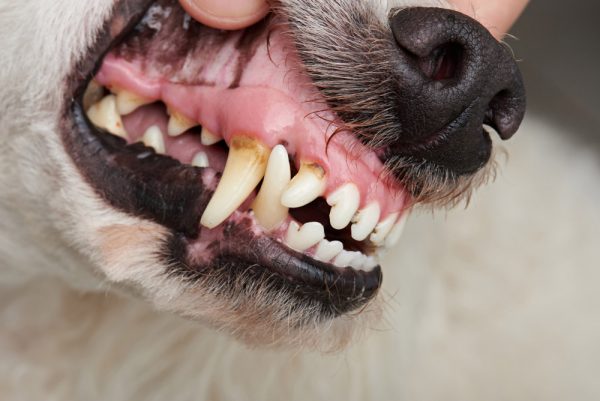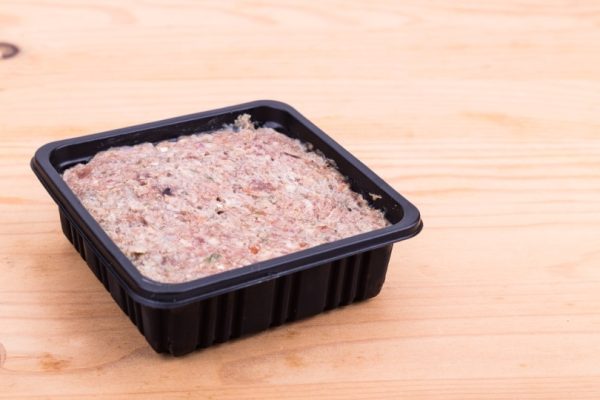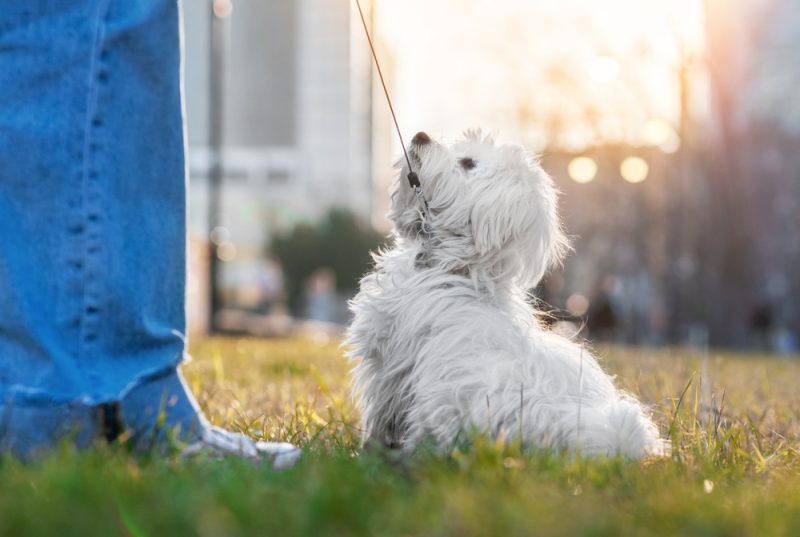Goldendoodles are adorable and quirky dogs with a gentle nature. They get along with everyone, making them an excellent addition to families. But if it’s your first time becoming a pet parent, you shouldn’t let their cuteness and composure fool you into getting one without thinking too much about it.
Goldendoodles are friendly and sociable, they need plenty of mental and physical stimulation and are great family members. Their coat is thought to be hypoallergenic, however, no hypoallergenic dog really exists.
There are many more things to consider before buying a Goldendoodle. Let’s discover all of the pros and cons of these dogs below!

A Brief History of Goldendoodles
It’s important to learn about the origin of your new family member before welcoming them to your home. Doing so will help you a lot in making the right decision. So, where did Goldendoodles come from?
The Goldendoodle isn’t a pure breed but a cross between a Golden Retriever and a standard Poodle. In fact, the American Kennel Club (AKC) doesn’t recognize Goldendoodles as a standard breed yet. That’s because this registration is only for those purebred dogs with a long history.
Goldendoodles were spotted around 1969 for the first time. Monica Dickens, the great-granddaughter of Charles Dickens, bred the first Goldendoodle. But unfortunately, this crossbreed didn’t become very popular around that time.
It wasn’t until the 2000s that Amy Lane started the first known Goldendoodle breeding program. She also bred the first known miniature Goldendoodle in January 2002. That’s when Goldendoodles began spreading across the globe, particularly in America and Australia.
However, it’s not necessary for Goldendoodles to inherit their parents’ every trait. They might have a different coat or won’t naturally be good at guiding. But for dog lovers, that’s not something to worry about. The quirky and loving personality of these dogs is enough to fall in love with them!
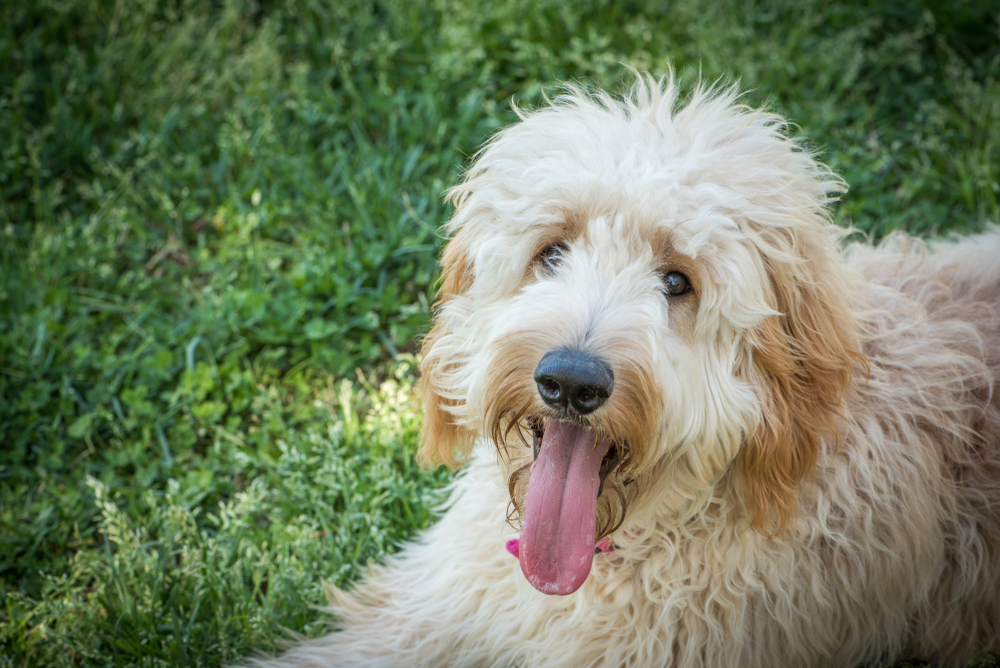

The 9 Pros of Getting a Goldendoodle
Let’s start with all the good things about owning a Goldendoodle. These adorable pups are not just about the looks; there is more to them than what meets the eye. Here are nine reasons you should adopt a Goldendoodle today:
1. Goldendoodles May Shed Less Than Other Breeds
We all love Goldendoodles for their gorgeous golden coats. Like every dog, Goldendoodles’ coats also shed, while the shedding is thought to be lower in this breed, the truth is that allergens are shed through dander and therefore they can also cause allergies.
However, you must regularly brush your Goldendoodle’s coat, give them occasional baths, and trim their fur to ensure they look beautiful round the clock.
Remember, the shedding level varies from one Goldendoodle to the other, so your dog may shed more or less than your friend’s.
Although no dog is completely hypoallergenic, regular bathing can help reduce the amount of dander and other allergens in their fur and the air. We highly recommend Hepper's Oatmeal Pet Shampoo for this job!
- Only Natural Pet Shampoo - Our vegan, plant-based formulation is made with safe and natural...
- No Soap - A cat and dog wash free from soaps, glutens, dyes, DEA, sulfates and phthalates means it's...
- Colloidal Oatmeal - Formula soothes and nourishes dry, irritated skin, providing itchy skin relief...
At Dogster, we've admired Hepper for many years, and decided to take a controlling ownership interest so that we could benefit from the outstanding designs of this cool pet company!
2. Goldendoodles Have Three Types of Coats
Goldendoodles have three types of coats: straight, wavy, and curly—all attractive on their own. The straight coat, however, resembles their parent Golden Retriever’s the most.
The wavy coat is the most common. It combines the Golden Retriever’s straight hair with the Poodle’s curls, giving the Goldendoodle a striking appearance. The curly coat inclines toward the Poodle’s genes, while the straight coat resembles the Golden Retriever.
Each coat type has different grooming needs, so consider them before bringing a Goldendoodle home. However, their allergic response and shedding levels are almost the same.
You will also find color variations among their coats. These include golden/apricot, blonde/cream, chocolate, black, parti, phantom, and merle. This way, you can choose your new family member’s coat type and color according to your preferences.
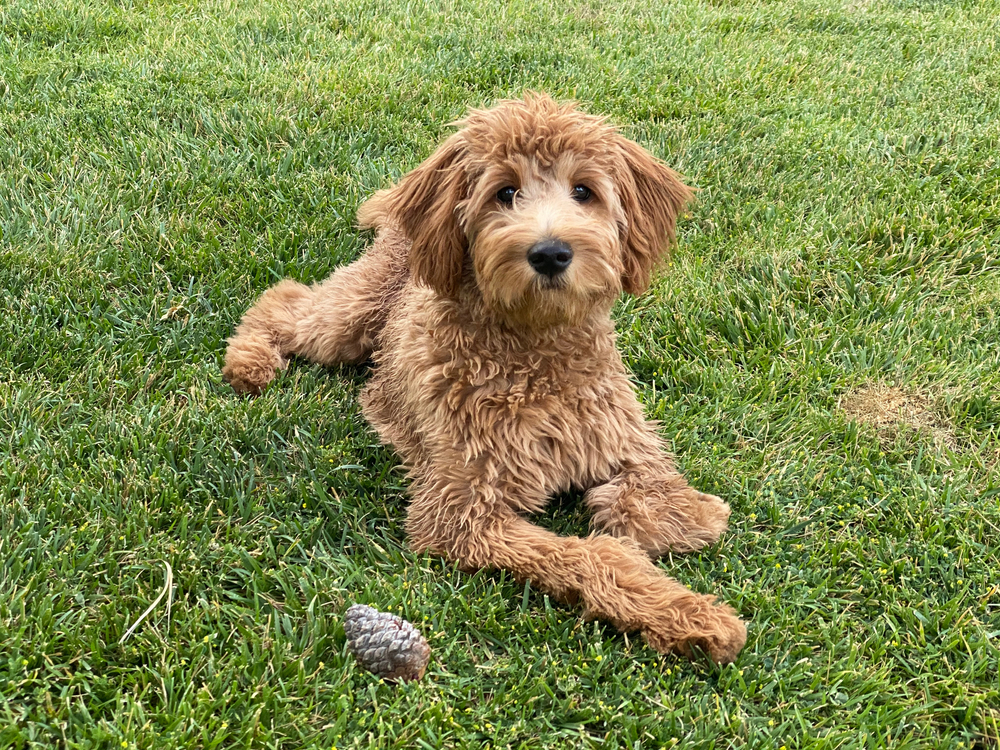
3. They Come In Various Sizes
These dogs vary greatly in size. They are:
| Petit: | Less than 14 inches and under 25 pounds |
| Miniature: | 14-17 inches and 26-35 pounds |
| Medium-sized: | 17-21 inches and 36-50 pounds |
| Large-sized: | Over 21 inches and over 51 pounds |
While the petit and miniature Goldendoodles are a good fit for small apartments, medium and large ones suit bigger houses the most. Either way, you will bring an energetic addition into your family.
Goldendoodles are also quite sociable and intelligent, regardless of their size. A miniature dog means that the breeder cross-bred the Golden Retriever with a toy or miniature Poodle instead of the standard-sized one.
4. They Can Participate in Many Sports Events
As you know, none of the renowned breed associations—American Kennel Club (AKC), United Kennel Club (UKC), and Continental Kennel Club (CKC)—recognize Goldendoodles as an official breed because they are a designer crossbreed. Yet, you can register your dog at major obedience or agility events at these clubs.
However, the CKC has an exception for mixed breeds. If you provide documents for your Goldendoodle’s parents, they can issue official registration papers identifying the registered dog as a non-purebred canine.
So, if you want to participate in fun, thrilling performance events with your pet, the Goldendoodle will be the perfect fit for you. They are also quite agile, so who knows, they might even win!
5. Goldendoodles Love Spending Time With Their Owners
You will always find your Goldendoodle asking for your attention. These dogs like spending time with their owners, whether you’re watching TV, bathing, or maintaining your backyard. They also love receiving appreciation from their human parents through kisses and gentle snuggles.
However, some Goldendoodles are adventurous. If your pet has a similar nature, they may spend some time of the day away from you. But most of the time, they will be snuggling beside you.

6. They Bark Occasionally
Let’s be real; nobody likes a dog that barks excessively. Even though barking is a normal dog behavior, this can be quite problematic, especially if you live in a neighborhood with close neighbors. Fortunately, Goldendoodles are not among the most barking breeds, and they will probably only bark when they feel threatened or scared. Some may also do so when asking for your attention or something they need.
These dogs may also bark out of excitement, such as when they see you after a long time or they are playing a fetch game. Besides these instances, Goldendoodles stay quiet even when other dogs in their surroundings bark loudly.
7. You Will Have a Swimming Partner
Swimming can get boring if you don’t have a partner. So, adopt a Goldendoodle to have an all-day companion. These dogs love swimming, and why wouldn’t they? Their parents are known as one of the best swimming breeds out there.
In fact, swimming is actually great for Goldendoodles’ health. It helps them speed up their paddling technique—one reason why many organizations train them to become rescue dogs.
8. Goldendoodles Get Along With Kids
Goldendoodles are super active dogs with high energy. Because of this, they sometimes get too excited and start jumping or barking excessively. However, that’s just a few instances. With proper training, these dogs can learn to behave well over time.
Generally, Goldendoodles are quite patient and gentle. You will find them getting along with people of all ages, whether adults or children. So, if you have kids at home, a Goldendoodle can become their best friend. But it’s important to keep an eye on them when you have just adopted the dog. They may nip the toys or even your kids during playing sessions since the experience is new for them.
The good thing is that these dogs have taken the gentle mouth of the Retrievers. So, don’t worry; their nipping won’t cause much damage. Work on your Goldendoodle’s behavior and they will turn out to be the calmest and most caring dogs in no time.
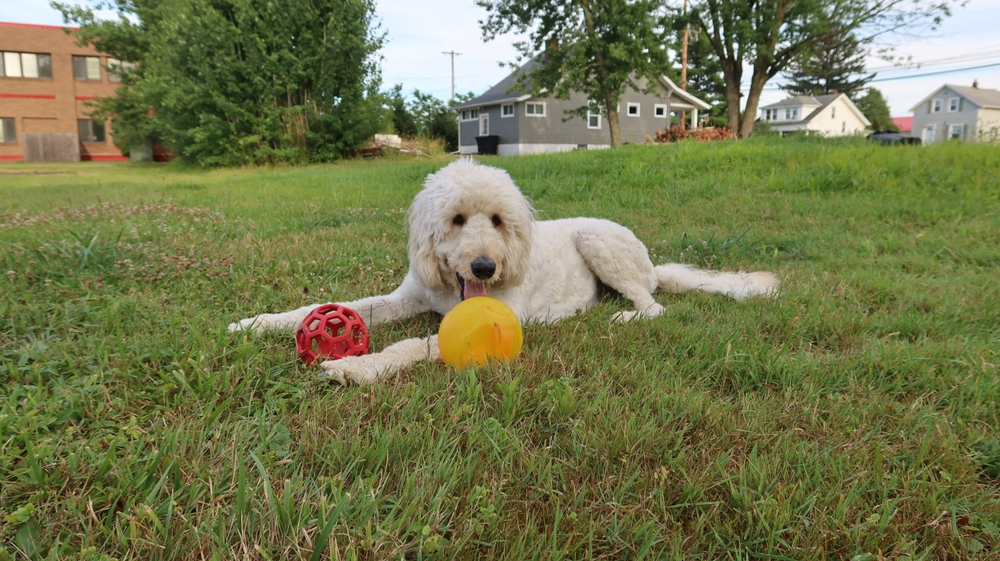
9. Goldendoodles Are Not Aggressive With Other Pets
Goldendoodles are not only gentle with humans but also get along with other pets. The only exception is when they feel threatened by the presence of a stranger in their home. But other than that, these dogs like being around other animals, especially cats.

The 5 Cons of Getting a Goldendoodle
It’s hard to believe that there are any Goldendoodle cons, but they have a few. Here are five reasons why you should think twice before adopting a Goldendoodle:
1. Goldendoodles can have different F-Status
Goldendoodles available for adoption or purchase usually have different types of F-statuses mentioned. It refers to “filial,” representing the generation or lineage a dog belongs to. Through the F-status, you can easily tell about the parents’ breed of a Goldendoodle puppy.
For instance, if a Goldendoodle has an F1 designation, it means they are a first-generation dog—a direct result of the Golden Retriever and Poodle breeding. An F2 Goldendoodle represents a dog bred from two Goldendoodle parents—the second-generation breed.
Similarly, F3 status refers to any dog after the F2 breed. You may also see the F1B status on Goldendoodles. It represents back-crossing, meaning a Goldendoodle bred with either a Poodle or a Retriever.
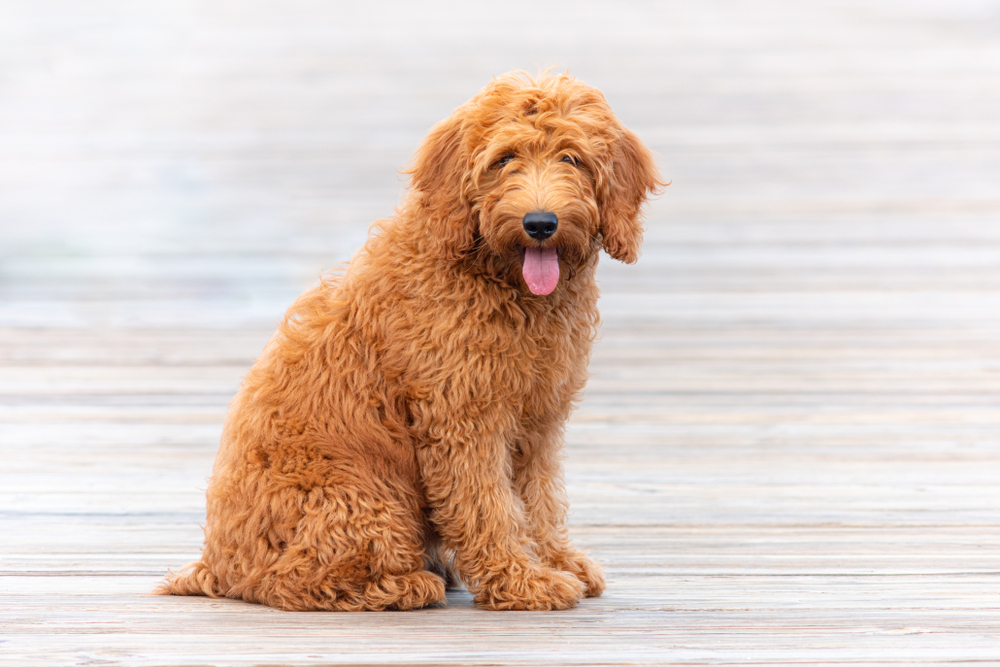
2. Goldendoodles Are Susceptible to Hip Dysplasia
Like every dog breed, Goldendoodles are prone to many health issues. While some are hereditary, others can be developed over time. Although these dogs have a decent lifespan of 10 to 15 years, you might be able to extend this duration with sufficient care and love.
One of the most common issues in these dogs is hip dysplasia, considering both Retrievers and Standard Poodles seem to be predisposed to it. This condition develops when the dog is in their development stage.
Hip dysplasia puts the Goldendoodle in extreme pain and discomfort. It causes changes to the shape of the hip joint causing the cartilage to tear over time and leading to osteoarthritis, muscle stiffness, and restricted mobility.
If your dog has this condition, they will need veterinary intervention. However, it’s important to note that the OFA or PennHIP associations can test parents and puppies for the development of hip dysplasia.
Remember, many unauthorized breeders try to manipulate pet parents in different ways when asked about the exam reports. Dealing with them can be a headache. The best solution is to avoid the breeders who don’t immediately provide you with this information.
3. Goldendoodles Need Physical and Mental Stimulation
Goldendoodles are known for needing lots of physical and mental stimulation to stay happy and healthy. So, no matter how busy you are, you must take your pet outside daily for running, playing, and walking.
Not only that, but you will also have to maintain proper exercise sessions for them at home. Goldendoodles generally need at least 60 minutes of daily walking and playing combined.
If they don’t get enough daily exercise, you may get to see their destructive side. They will be running around the house or nipping household items to release the high energy built up inside them. That’s why medium to large Goldendoodles aren’t the best fit for larger homes.
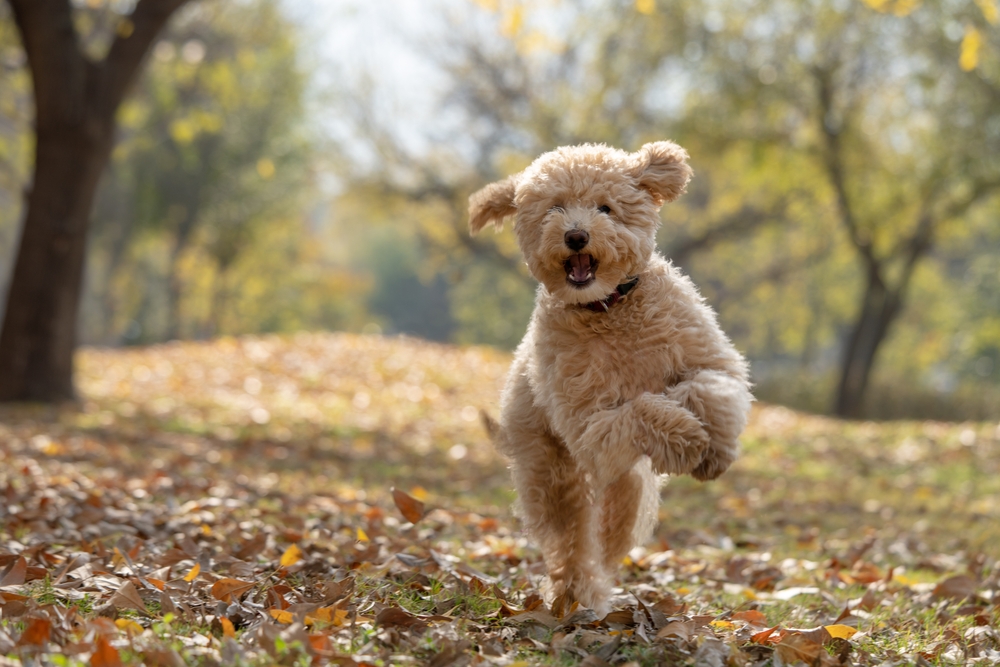
4. Goldendoodles Can Still Cause Allergies
One of the primary purposes of creating this crossbreed was to have a hypoallergenic dog for people with allergies. Yet, many pet parents have reported allergic reactions to Goldendoodles. Some may be inclined to think that larger Goldendoodles shed more than miniature dogs in this breed, while the amount of hair shed may be related to the size of the dog, the amount of allergens is not.
5. They Are Very Expensive
A Goldendoodle may not be your ideal fit if you’re on a tight budget. As a designer breed, these dogs are more costly than their parents. You can expect to pay around $2,000 to $4,000 for one pup, excluding the initial puppy vet costs and other expenses.
The initial cost to get your Goldendoodle is not the only one that you will have to assume. If your Goldendoodle has a medical concern, you will have to pay the vet expenses associated with it. Besides hip and elbow joint problems, these dogs can also suffer from eye conditions and digestive problems among others.
So, always ask for the medical reports of the dog and their parents before bringing one to your home. It will give you a clear heads-up of the expenses your Goldendoodle will need in the future.

Final Thoughts
Goldendoodles are loving, sociable, and quirky dogs with lots of energy. However, their characteristics largely depend on the genetic traits they inherit from their parents.
When the Poodle genes dominate, the Goldendoodle typically features a wavy or curly coat, which is often thought to be better for allergy sufferers. In contrast, those leaning more toward the Retriever lineage may have a straight coat and higher demands for mental and physical stimulation. It’s important to note that while Goldendoodles are often labeled as hypoallergenic, they can still produce allergens and may not be suitable for people with allergies. Additionally, Goldendoodles can vary significantly in appearance, influenced by the traits of their parents.
Overall, the pros of these adorable dogs outweigh their cons, which is a green signal if you want to adopt one. But to stay safe, consider the Goldendoodle’s cons beforehand.
See also:
- How to Trim a Goldendoodle’s Face: Vet-Approved Tips
- Do Goldendoodles Bark a Lot? Vet Approved Facts & FAQ
Featured Image Credit: Jennifer McCallum, Shutterstock




